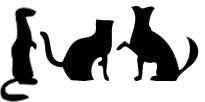Geriatric Years 101
/Oh my “aches and pains” or maybe it might be “my memory is not as good as it used to be”…. we all experience getting older it is “par for the course”. Unfortunately,our animals can’t vocalize the mental and physical changes that occur as they age. The responsibility lies with us to pay close attention to their behaviors that might warrant a trip to the veterinarian. No one knows their pet better than you do and the information you provide is vital to help with diagnoses.
Age is definitely related to the size or breed of animal. For example,a Great Dane is considered senior at about 6 years where a small dog - such as a chihuahua or a cat would be considered senior at approximately 10 years. A ferrets life span is typically 7 -8 yrs so they are considered geriatric at around 5 - 6 years. It is also important to understand that there is a difference between a “senior” animal and a “geriatric” animal.
We use the term senior to describe an aging pet that has reached a certain age.However,geriatric is a term we use to describe an animal who is much older and facing end of life health issues.Typically in a young and healthy pet we recommend yearly wellness exams.However,as your pet ages we encourage you to bring your beloved animal in to see us 2 times per year for a physical exam and baseline bloodwork. Cats are masters of disguise and so often lead us to believe they are healthier than the day they were born …when we do see them often it is too later to treat. This is a trend we see far too often!!
Certain changes in behavior - whether it be physical or mental - might not seem like anything too much to an owner but to us it signals a red flag.Regular blood work can catch early onset of many different medical issues as well as give us a baseline. It might also tell us that even though your animal is considered geriatric….. on paper he looks great!! Diagnostics are crucial when looking at the whole health picture.We also understand that at times this can be taxing emotionally and financially.We do our best to keep that in mind and provide you with practical treatment options.
With aging animals it is important that we see them more frequently.Communicating with our clients and being able to provide geriatric care tailored to meet the needs of your pet is very important to us.As your pet ages we give vaccines less and less .We only give the ones that are required to keep your pet protected.. Our focus is more about educating our owners and giving them the necessary information to help them manage medical issues going forward. Medicine is forever changing and improving in ways that can help to keep your elderly pet comfortable.Maintaining a quality life even through the “golden years” is a service we hope to provide!
Look for our next geriatric blog on Cognitive Dysfuction Syndrome.

